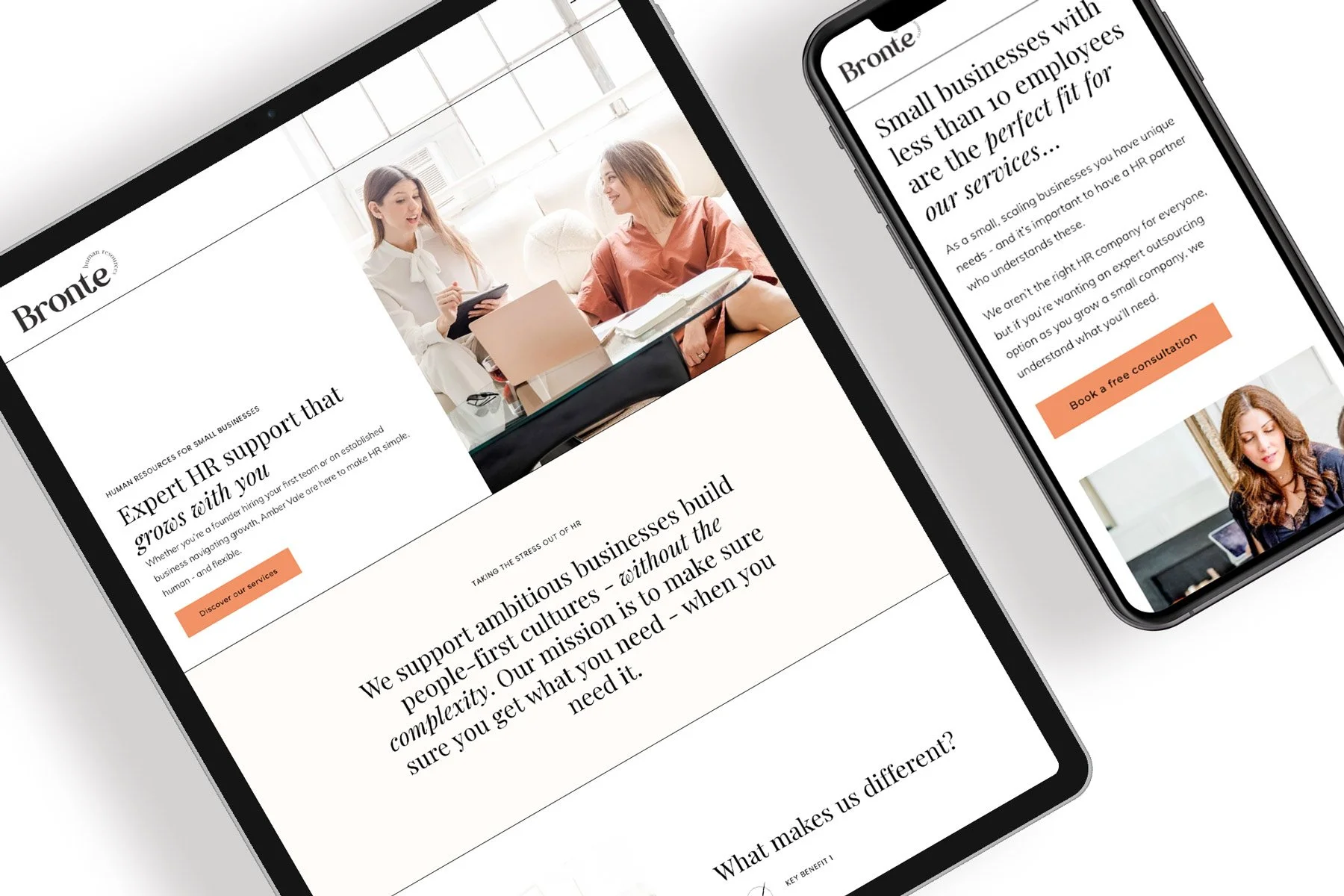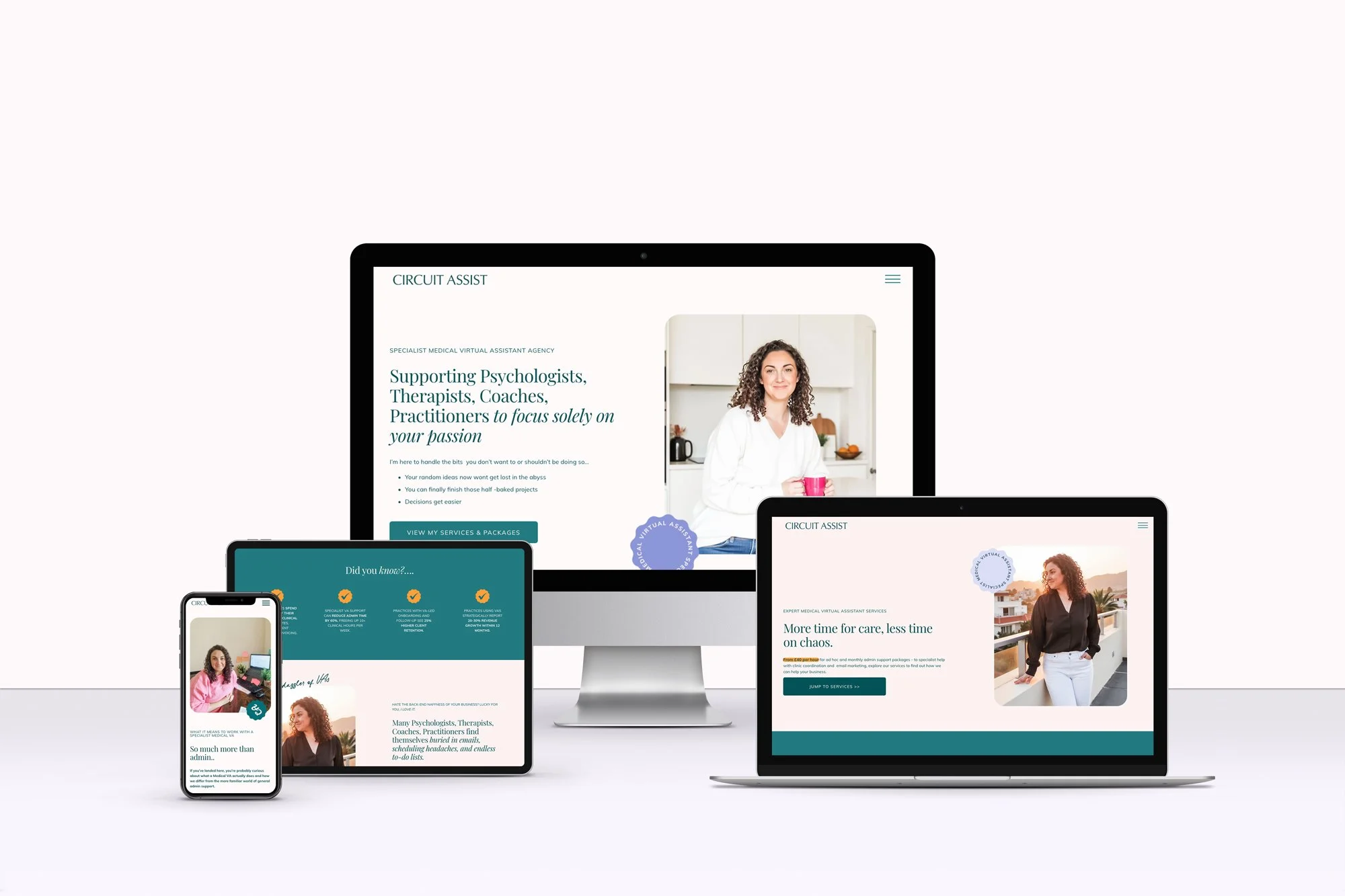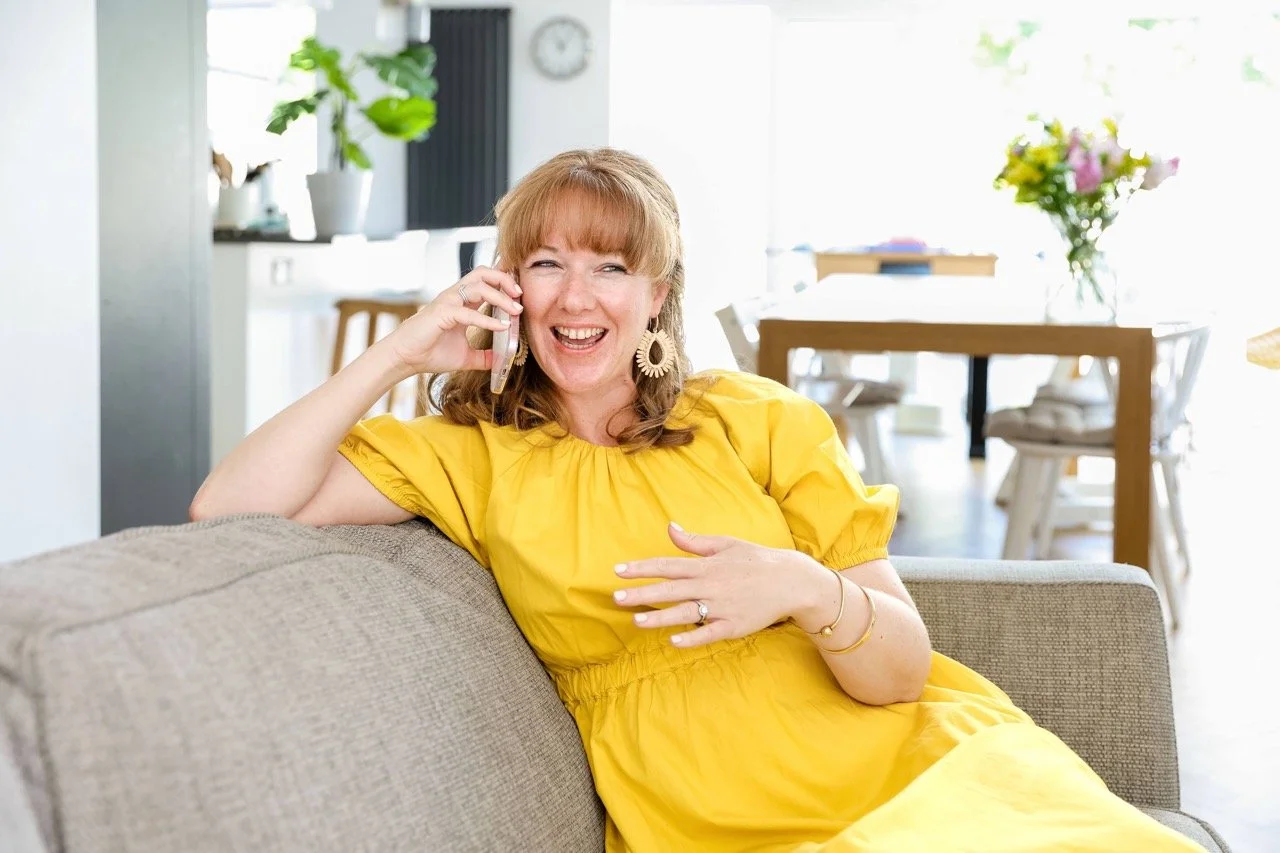Web design for consultants: How to build authority & win more clients
As a consultant, you know your consultancy website is one of the first impressions potential clients have of you and your work.
Essentially - your consultancy website is your digital office.
So it needs to make a great first impression, showcase your incredible services and highlight your experience. And above everything, be set up to turn interest into action.
Every page should reflect your expertise and make it incredibly simple for visitors to understand how you can help them.
Since launching Bright Avenue, I’ve worked with many independent consultants and larger consultancies to create polished, professional websites that capture what they’re all about and really move the needle for their businesses.
Short on time? Jump to
What are the key elements of web design for consultants?
How do you make your consultancy website more powerful and drive more sales for your business? Here is where to start:
1) Answer this: ‘How are you going to get traffic to your consultancy website?
Firstly, your website needs consistent, relevant traffic to generate enquiries.
Before starting, be super clear on where this traffic will come from. This will vary from busines to business, but might include: social media, email marketing, paid advertising and search engine optimisation (SEO is being found in search engines such as Google).
If you want your website to be found by search engines, focus on search engine optimisation (SEO) when building your website. Use keywords that match what potential clients type into search engines. Include these in your page titles, headings and service descriptions. SEO is a huge area, there’s lots of different elements to consider. I highly recommend using the SEOSpace plugin if you have a Squarespace website.
2) Have a strong content strategy
This is so important.
Your content strategy is how you communicate your expertise to potential clients, and answer the questions people ask before hiring you.
It’s a part of the web design process that can sometimes get forgotten, or not seen as important - but in my experience a content-first website always delivers better results for my clients.
Use a simple page structure (the section below covers what pages to include for a high-converting consultancy site) and then spend time writing compelling, on-brand copy to include on each page. If you’re struggling, reach out to a copywriter - you won’t regret it.
I’ve included more advice and guidance on content strategy further down (click here)
3) Consider user experience
Once you’ve got your content sorted, next think about how you’re going to structure your site. User experience (UX) determines how easily visitors can find what they need on your website. Here are some of my top tips to ensure your website offers a good user experience:
Keep your layout intuitive, and use clear menus and short navigation paths (whilst it’s sometimes tempting to go a bit zany with your design, remember clarity builds confidence - so as much as possible, put elements where people would expect to find them!)
Use headings, bullet points and short paragraphs to make your content easy to scan.
Be intentional when using your branding including your colour palette and graphics - if you’re unsure, use branding elements minimally at first.
Use consistent fonts to create a professional look.
Add call-to-action (CTA) buttons that stand out visually and use clear wording such as ‘Book a Discovery Call’ or ‘Request a proposal’. The clearer the CTA, the more likely it will be clicked.
What pages do I need on my consultancy website?
Chose your pages carefully to make sure potential clients understand what you offer and how to work with you.
Each page should have a clear purpose, guiding visitors smoothly through your services.
In addition to your homepage, you should include:
1) Service page/s
Depending on the level of detail you want to go into, decide whether to include:
One overarching services page summarising all your individual services
An individual page for each service
Regardless of which approach you chose, your service pages should clearly explain what you do and - just as importantly - the results clients can expect.
Each page should include a short introduction, a breakdown of your services, and a call to action.
Describe each service in practical terms. Be as specific as possible - remember clarity builds confidence.
For example, instead of saying you ‘improve employee satisfaction’, say you ‘help companies reduce employee turnover by 20% through employee coaching’.
A simple table can help summarise your offerings - for example for Bright Avenue this would look like:
| Package | Who is it for? | Cost |
|---|---|---|
| The Glow-up Day | For businesses looking for a budget-friendly, value-packed way to brighten an existing website. | £750 |
| The Illuminate Semi-Custom Web Design | For new businesses looking for an affordable online home, without compromising on style. | From £1,100 |
| The Radiate Fully Custom Web Design | For established businesses ready to invest in a bespoke online presence that sets them apart and supports their growth. | From £1,850 |
2) About or team page
I always say to my clients - more people will visit your about page than you think! Don’t make it a dry with CV-vibes - this is your opportunity to showcase your personality and build trust and connection with your visitors. Show:
who you are
what makes your consultancy unique
how you are best-placed to solve your clients’ problems.
Keep it professional but friendly. Introduce your team with photos, short bios, relevant qualifications and social media links. It helps people see the real humans behind the business.
Ultimately, remember your About page is not just about you. Focus on what matters most to clients - that you completely understand their challenges and deliver measurable results.
3) Contact & booking page
Your contact and booking sections should be easy to find and simple to use.
Offer several ways to get in touch: email, phone, and a contact form.
If you offer discovery calls, or a free initial consultation - use an online scheduler such as Calendly so clients can book straight away without any back-and-forth emails.
If you have multiple offices or work internationally, also list time zones and office hours to avoid any confusion.
4) Blog
Blogs, like this one, are a great way to show your expertise and attract new visitors via search engines. Share insights, case studies, and practical advice related to your consulting work.
Write posts that answer common client questions or explain trends in your field. For example, I use my blog to offer helpful web design advice for small businesses and freelancers.
How do I make sure my Consultancy website fully communicates my expertise and credibility?
A strong online presence builds trust and showcases your expertise. Here’s how to make your website do both:
1) Brand consistency
Your website should look and feel like your business does on other digital platforms such as Linkedin, Instagram and YouTube - as well as your business cards and other printed marketing materials.
This can be achieved by using the same logo, colour palette and typography across all touch points. This will make your brand instantly recognisable.
Visual consistency signals that your consultancy is organised and reliable (and honestly, it just looks better).
2) Share your expertise
Provide practical advice, data-driven insights and real case study examples from your projects. Show what you’ve achieved, not just what you say you will! On my website, www.brightavenue.co, you’ll find my portfolio where I share example websites I have previously built to demonstrate my experience alongside client testimonials.
If you have it available, also add thought leadership content to your website (you can read a blog I wrote about this here).
Always speak directly to your audience using clear, confident language that reflects your experience. And over time, your consistent messaging and valuable content will help position you as a trusted voice in your field.
What should my content strategy be?
I honestly can’t stress enough how important your content strategy is.
Because at the end of the day, only the right content strategy will truly connect with your perfect-fit consultancy clients.
Your website content needs to show how your consultancy services solve potential clients problems. The reality is, most visitors just want to know if you understand their challenges…and can help.
Don’t only include blocks of text. A more engaging content strategy might include:
Step-by-step guides or frameworks
Short videos introducing your approach or team
Case studies: A great website focusses on client wins, not just your process.
Process / flowcharts : Despite the above, it’s good to share your process with clients - some people really love all the details!
Testimonials: Share short, honest feedback from clients - ideally, where they mention specific, tangible improvements. According to G2’s 2024 B2B Software Buying Behavior Report 92% of B2B buyers are more likely to engage with a business after reading a trusted review.
Email Marketing
Integrate email marketing on your website to keep in touch after someone visits your site. Offer something useful - a ‘lead magnet’ such as a checklist, guide, or mini-training - in exchange for their email.
Use tools like MailerLite, Kit or Flodesk to automate follow-up communication. Keep your messages relevant and regular to stay top-of-mind and turn subscribers into future clients.
FAQs
What should every consultant’s website include?
Be clear about who you are, what you do, and how to get in touch. Add a professional bio, service descriptions, and case studies with real results.
Which platform is best for building my consulting website?
Pick what fits your skills and business goals. Squarespace is great if you want a secure, easy-to-maintain website. WordPress offers more bells-and-whistles.
✢ Read my blog post here on which web platform is best for your business
How often should I update my consultancy website?
It's a good idea to refresh your content regularly, which is why I normally suggest Squarespace due to its ease of adding new content. You should update your website with new services, recent client wins, or just share what you've learned in your field lately. That way, people (and search engines) know your business is still alive and worth their attention.
Keep reading:




















